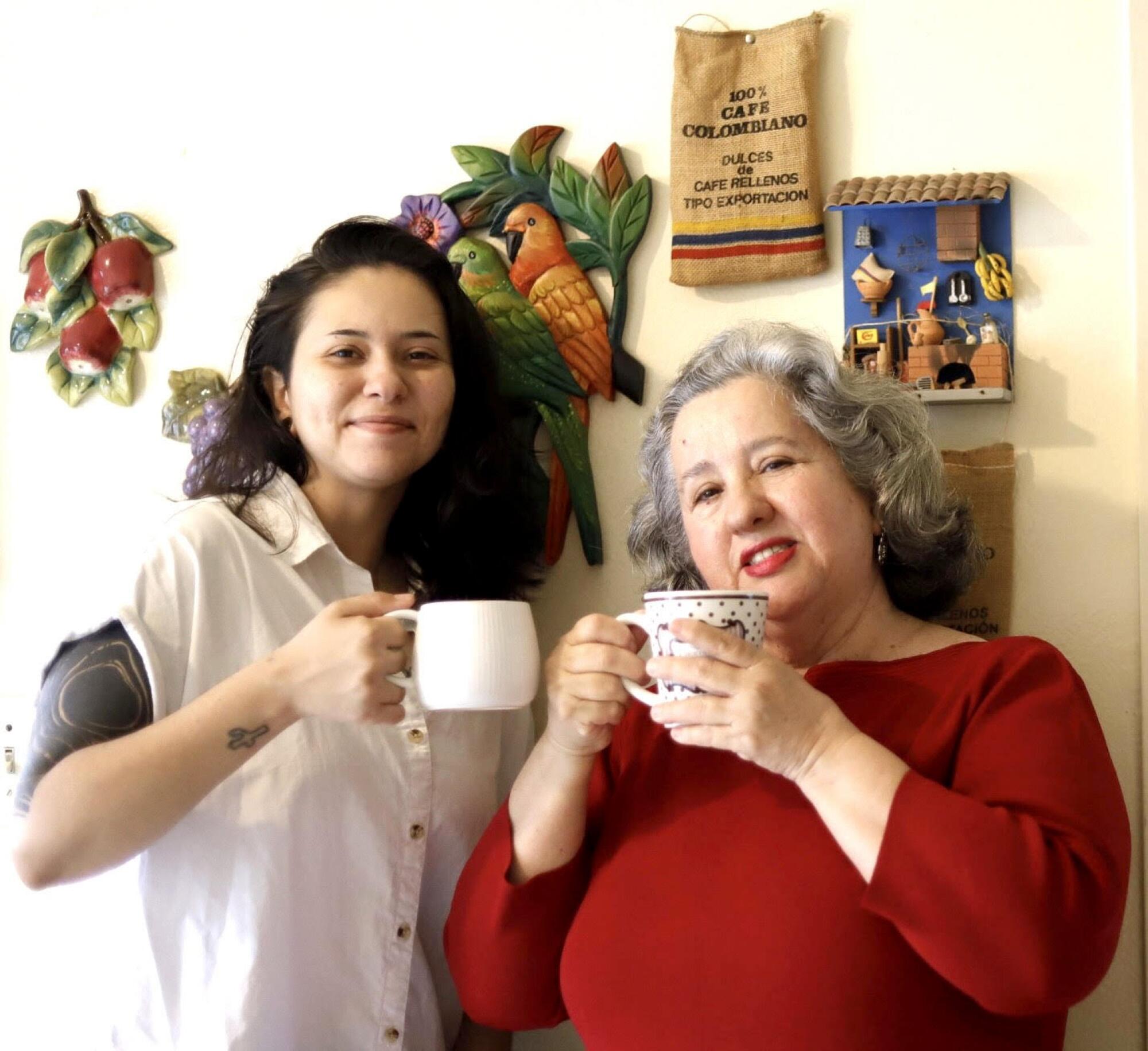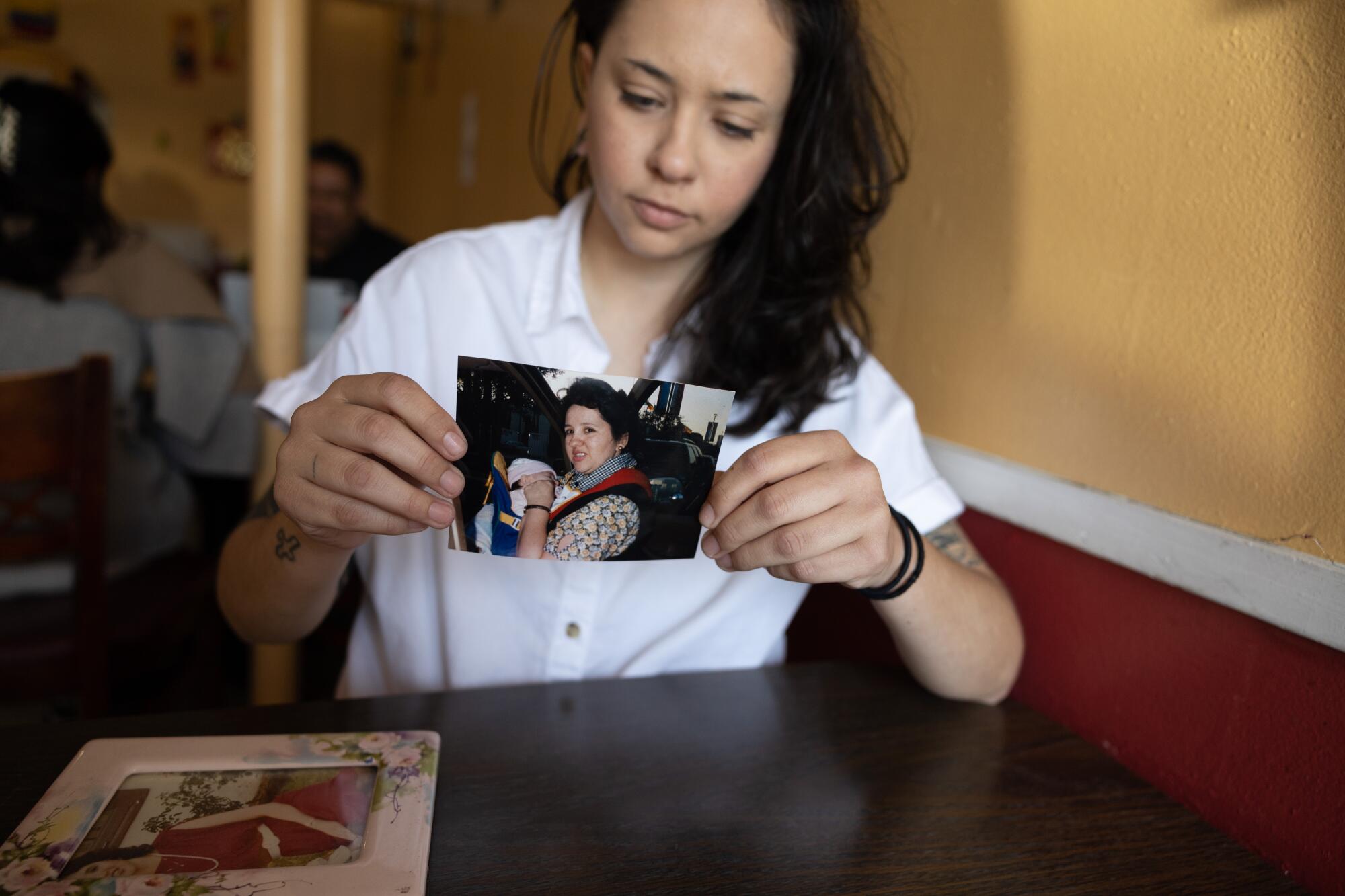GENERACIONES
This series is part of a collaboration between De Los and Boyle Heights Beat. Youth reporters interviewed young Latinos and their parents to explore how generational differences shape their identity and how they’re bridging divides.
For Gisselle Palomera, growing up in a Jehovah’s Witness household often felt isolating. There were no gatherings with cumbias blaring or primos and tías exchanging banter because most celebrations, including birthdays, were frowned upon. Learning about their Mexican and Colombian heritage took a backseat to religious teachings. Even friendships with people outside their faith were discouraged, Palomera said.
“I didn’t have any friends who were my longtime friends. I didn’t have any close cousins,” the 26-year-old multimedia journalist recalled. “We didn’t share any of those memories growing up … because we were always kept away from that.”
Without close family or friends, and a lack of cultural perspective, Palomera struggled to find their identity during their teen years. When they came out as queer, their mother sent in church elders for an intervention, then largely avoided the conversation. As a nonbinary person, Palomera felt they had no place in a congregation that denied their identity and enforced traditional gender roles.

Gisselle Palomera, left, and their mother, Gloria Palomera, are living together again after almost two years apart.
(Gisselle Palomera)
At 15 years old, Palomera decided to leave the religion.
“Those were the most formative years. That’s when you’re figuring out who you are, when you’re hoping you have friends to fall back on that guide you toward life, or you have family who also care about you,” said Palomera. “It was really crazy to get out of that church and realize that I had nothing.”
Gisselle’s mother, Gloria Palomera, says it was hard to understand why they would want to leave the faith. For her, the congregation provided what she missed most from her hometown in Colombia: community and family. In 1973, Gloria immigrated to the U.S., landing in West L.A. with her mother and sister. After her parents separated, she blamed herself and wondered why her family fell apart.
“Lo que buscaba, era una familia. Qué hacer yo para que mi familia estuviera unida, viviéramos en paz, viviéramos felices?” Gloria said, fighting back tears as she retold her family’s immigrant story. “Lo más difícil fue la separación. … Nos arrancaron de nuestras raíces.”
In her search for answers, Gloria found Jehovah’s Witnesses. After two marriages and four children, she continues to be a devoted member of the congregation, even though, along the way, that devotion has caused rifts between her and her family.
Much like Gisselle, Latinos are increasingly leaving organized religion. About 30% of Latino adults in the U.S. are not religiously affiliated, up from 10% in 2010, according to a report by the Pew Research Center.
The rate is much higher among younger generations, with half of U.S.-born Latinos between the ages of 18 and 29 saying they don’t identify with any religion.

Gisselle Palomera left Jehova’s Witnesses at 15, causing a rift in the relationship with their mother. Now at 26 years old, they are finding new ways to better their communication.
(Julie Leopo / for De Los)
Gloria sees those changes as the result of a younger generation’s “selfishness” and isolation, saying communities and families were much more united during her time. While the pair acknowledges that generational differences affect the way they understand each other, they admit that acceptance and support will have to go both ways, especially now that they’re living together again after almost two years apart.
We sat down with Gisselle and Gloria to have a candid conversation about the role religion has played in their family dynamic and how they continue to work through generational differences to understand each other. The interview has been edited for length and clarity and kept in its original language to preserve the quality of the reporting.
How do you think being raised in a strict religious household shaped your cultural identity?
Gisselle: [It made] me feel like I should push away any part of my culture and just assimilate, which is what I think my mom’s generation did —parents that tend to strive for us to assimilate to this life because they think that’s the best thing for us rather than knowing who you are and accepting your cultural differences. … It’s taken me a lot more time to realize, “Oh, I love being Colombian, I love being Mexican.”
What do you think it takes to see each other’s point of view?
Gisselle: I think conversations like this. It’s taken a lot of understanding, education, reading, networking with people that are different from me. … I understand that as a woman with no education, with all these cultural norms and expectations that her mom had for her as one of the eldest, she was dealt a really sh— life.
Gloria: Ayudar, tenerle paciencia, hablar con ella, escucharla. Pero a veces no podemos hablar. Ella se enoja o yo me enojo o ella grita o yo grito. … Yo quisiera que viviéramos en paz, con respeto, con armonía, como amigas. Que a pesar de todos los problemas que hemos vivido, que ella entienda mi posición y situación.
What is something your generations don’t understand about each other?
Gisselle: I think that her generation is very OK with how things were and how things are, and accepting, for example, of gender roles. But I’ve had to rethink that entirely because I’m queer. I don’t fit into these gender roles, and I never liked it because of the religious way that I grew up.
Gloria: No es que no entienda, sino que es muy diferente a como nosotros éramos, como crecimos. [Eramos] más unidos, las familias compartíamos y convivíamos. Hoy día hay como un poquito de egoísmo.
Do you have advice for young people in similar situations?
Gisselle: If I could say anything to anybody in my generation struggling with the same issues with their parents and different generations is that you have to be the one to take a step back and try to look at the bigger picture. In doing so, I think you really can understand the traumas, the dynamics, the insane issues that all went into how your parents were raised, and [how] that all affects you.
Kathryn Mora is a graduating senior at Felicitas and Gonzalo Mendez High School and youth reporter for the Boyle Heights Beat. She will be attending college in the fall and double majoring in philosophy and English.

